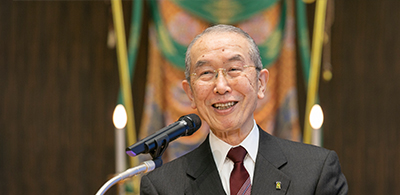Words with a Calming Effect
July 2018

Honestly and Sincerely
Right speech is one element of the Eightfold Path, a basic teaching of Shakyamuni. It means speaking words that are consistent with the truth, but usually, we are hardly aware of this “speaking correctly,” are we? Therefore, even when we are told about right speech, perhaps there are not many people who can immediately tie it to their daily practice. Even so, in our daily interactions with other people, we should naturally converse with them in a manner that has a calming effect on the situation. The reason is that doing so is more enjoyable and puts everyone’s mind at ease.
Right speech can be understood to mean saying things that are beneficial, and as peace and harmony are extremely important in our lives, that is, as they are beneficial to us, words that have a calming effect on the situation can indeed be called right speech. Therefore, we could say that everyone is, without ever knowing it, practicing right speech.
However, at times we end up using words that disrupt peace and harmony. A particular case of this is telling a lie that helps our own circumstances or giving a false account of what really happened.
In his admonishments to lay disciples, Shakyamuni said: “You must not speak falsehoods to others,” and also, “Only speak words that will not give you trouble or hurt other people.” Lying misleads people, destroys harmony, and in the end, causes yourself trouble. Thinking this way, the important thing in practicing right speech may not be what you say or how you say it, but rather that you do not forget the conscience that lets you live honestly.
Dr. Gunnar Stålsett, recipient of the thirtieth Niwano Peace Prize in 2013, bishop emeritus of Oslo in the Church of Norway, and a past member of the Norwegian Nobel Committee, is a role model who reminds me that the attitude we take toward the other person we engage in dialogue is more important than the content of our words.
Even when participants at an international conference are of divergent opinions, Bishop Stålsett, right there, skillfully brings them together into consensus. Nevertheless, he is not garrulous. On the contrary, he is a man of few words.
He attentively listens to what various people say and, if asked, he expresses his opinion calmly. Finally, he consults everyone by asking, “What do you think if we did things this way?”
When people of different positions are seated at one table, their discussion may become complicated. What brings harmony to that situation is an attitude of listening carefully to people’s opinions and fathoming their thoughts, along with words that come from an attitude of fairness that reins in your ego. I think that this attitude manifested by Bishop Stålsett shows us the very essence of the meaning of right speech.
Embracing Sorrow
In Japanese, the Chinese character used to write “love” (ai) can also be read as “sorrow” (kanashi). Perhaps that is because to love and to cherish often involve sorrow, which may be easier to understand if we think about a mother’s heart loving and cherishing her child. Right speech, which is, namely, “saying what is right,” is imbued with the heart that feels such love and sorrow, as well as the kindness of wishing for the happiness of someone else, isn’t it?
To quote the words of Zen master Dogen (1200–1253), “Loving words arise from a loving heart, and the seed of a loving heart is a compassionate heart,” and I think that because Bishop Stålsett’s words are imbued with thoughts of compassion common to all people of religious faith, they can be accepted by anyone. Indeed, the Buddhist monk and poet Ryokan (1758–1831) convinced his profligate nephew to reform himself not with admonitions or scoldings, but with tears that ran straight down his cheeks when he thought of his nephew. This episode tells us that there exists right speech that is expressed through a silence full of compassion.
We pay homage to the spirits of our ancestors during the season of the Ullambana Festival, which Rissho Kosei-kai annually observes in July. While cherishing the pristine lotus flowers that are about to open, isn’t it good for us to reflect anew on the loving hearts of our parents and ancestors who, more than anyone else, wish for our happiness?
Back Number



